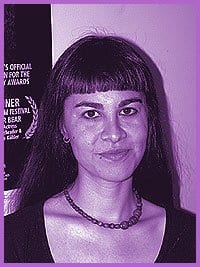Two years ago, the topic of the inaugural Sapphic Traffic column was the need for a dyke march in Ottawa. On Sat, Jul 10, this became reality. Ottawa’s first annual dyke march joined two other such events in Canada: Toronto’s dyke march, which was first held in 1996, and Vancouver’s dyke march, which is happening for the first time at the end of July.
Although lesbians partake in Pride parades, their visibility is often overshadowed by that of gay men, the leather community and drag queens. The overarching principle behind any dyke march is that women need a day to celebrate their own unique sexuality.
Dyke marches remain firstly politicized events, and secondly, social gatherings. What makes dyke marches unique and necessary is that they are the only public gathering that creates a visible women’s presence on the streets. As with other dyke marches, the members of Ottawa’s dyke march committee are a highly politicized group of women who are dedicated to getting their message across.
“Establishing a dyke march in Ottawa was a move towards creating solidarity in addressing a specific kind of oppression,” says organizer Jess Carfagnini, a member of the ad hoc Ottawa dyke march committee, which is comprised of 15 women. “Lesbophobia is a different prejudice from that which gay men experience. It’s a nasty mixture of sexism and homophobia. Even though some of us are comfortable enough that we forget we’re oppressed, we unfortunately still live in a sexist society. The dyke march is a move towards true inclusion by making women and trans people visible. It’s a march for survival that contributes to the celebration of Pride. And the next day, we all join our gay brothers at the Pride parade.”
Roughly 300 women attended Ottawa’s first annual dyke march – the same number of participants that took part in Los Angeles’ first annual dyke march. The march grew incrementally with many recruits joining the parade along the route. The women marching in Ottawa’s dyke march were multi-generational and multicultural, representing a diverse spectrum from Ottawa’s queer women’s community. Throughout the march, there were chants and signs protesting homophobia that also asserted queer women’s identity. Along the sidewalks, gay men and supporters applauded, confirming their backing of the marchers. Dozens of motorists enthusiastically honked at the women in the dyke march, while simultaneously giving a thumbs-up.
Distinct from Pride parade celebrations that increasingly include corporate sponsorship, dyke marches are grassroots happenings. The history of the dyke march is relatively recent with the event originating in the US. In 1992, women in Los Angeles, San Francisco, New York and Seattle, among other cities, began discussing the organization of a large-scale dyke march on the eve of the 1993 National March on Washington.
A few months later, it became the primary endeavour of the National ACT UP Women’s Committee and New York’s Lesbian Avengers. This project culminated in the largest dyke march in history with numbers estimated at 20,000 queer women taking to the streets of Washington DC. It is in this same tradition that organizers of dyke marches continue to plan similar events over a decade later. The dyke march has expanded beyond its North American roots to Europe, the UK and Japan. Mexico City recently had its second annual dyke march.
The success of Ottawa’s first annual dyke march has much to do with the energy of its organizers who adeptly spread the word about the march, and executed the event smoothly. Funding, however, remains an issue. This year, members of the Dyke march committee invested their own money in promotional tools, such as handbills and signs. Personal donations helped offset costs, as did selling T-shirts, which allowed the organizers to reimburse themselves for the initial outlay towards the march.
Funding from outside sources is necessary in order to foster the growth of Ottawa’s dyke march, as is building a relationship with the Pride Committee of Ottawa. Working collaboratively, the dyke march team could be a vital and integral committee of Ottawa Pride – a mutually beneficial relationship that would work to celebrate Ottawa’s queer women’s community in all its diversity.
Ottawa Dyke March 2005 promises to be an even larger event for queer women and transgender people. Organizers hope to double this year’s attendance, while at the same time making the march more accessible for women with disabilities.
To contact Ottawa’s dyke march committee, e-mail dykemarch@bust.com.

 Why you can trust Xtra
Why you can trust Xtra


